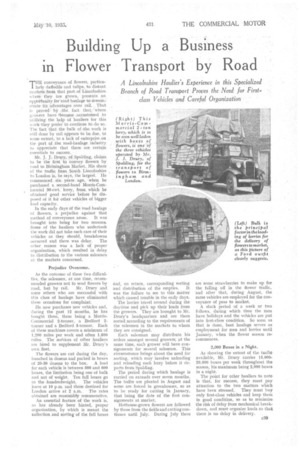Building Up a Business in Flower Transport by Road
Page 97

If you've noticed an error in this article please click here to report it so we can fix it.
THE conveyance of flowers, particu
larly daffodils and tulips, to distant markets 'fiele: that part, of Lincolnshire where they are grown. presents am opportunity for naafi haulage ta demon-. at rate its 'advantages over rail. That is proved • by ,the. fact that -"where growers have.became ..accustomed ,to utilizing, the help . of hauliers for this work. they prefer to continue to.do so. The fact that the bulk of thework is still done by rail appears to be, due, to some extent, to a lack of enterprise on the part of the read-Itaulage industry to appreciate that there are certain
essentials to success.
Mr. J. J. Drury,• of Spalding, claims
to be the first to convey. flowers :by road to Birmingham Market. His share of the traffic from :South Lincolnshire to London is, he, says, the largest. He commenced .sic years • ago, when he purchased a second-hand Morris-Commercial 30-cwt. lorry, from, which he obtained good service before he disposed of it for other vehicles of bigger
load capacity.
In the early days Of the road haulage of flowers, a prejudice against that method of conveyance arose. It was brought into being for two reasons, Some of the hauliers who undertook the work did not take such care of their vehicles as they should, breakdowns occurred and there was delay. The other reason was a lack of proper organization, which resulted in delay in distribution to the various salesmen at the markets concerned.
Prejudice Overcome.
As the outcome of these fry° difficulties, the salesmen, at one time, recommended growers not to send flowers by
road, but by rail. Mr. Drury, and some others who are successful with this class of haulage have eliminated these occasions for complaint.
He now purchases new vehicles and, during the past 12 months, he has bought three,' these being a MorrisCommercial 2-tonner, a Bedford 2tonner and a Bedford 3-tonner. Each of these machines covers a minimum of 1,200 miles per week and often 1,800 miles. The seredces of other hauliers are hired to supplement Mr. Drury's own fleet.
The flowers are cut during the day, bunched in dozens. and packed in boxes of 20-30 dozens to the box. A load for each vehicle is between SOO and 600 boxes, the limitation being one of bulk and not cif weight. Ten full boxes go to the -.hundredweight. The vehicles leave at 10 p.m. and those destined for London arrive at 2 a.m. The rates obtained are reasonably remunerative.
An essential feature of the work is, as has already been hinted, proper organization, by which is meant the collection and sorting of the full boxes and, on return, corresponding sorting and distribution of the empties. It was the failure to see to this matter which caused trouble in the early days.
The lorries travel around during the daytime and pick up their loads from the growers. They are brought to Mr. Drury's headquarters and are there sorted according to the requirements of the salesmen in the markets to, whom they are consigned.
Each salesman may distribute his orders amongst several growers; at the same time, each grower will have consignments for several salesmen. This circumstance brings about the need for .sorting, which may involve unloading and reloading each lorry before it departs from Spalding.
The period during which haulage is carried on extends over seven months. The bulbs are planted in August and some are forced in greenhouses, so as to be ready for cutting in January, that being the date of the first consignments at market.
Hothouse-grown flowers are followed by those from the fields and cutting continues until July. During July there are some strawberries to make up for the falling off in the flower traffic, and after that, during August, the same vehicles are employed for the conveyance of peas to market.
A slack period of a week or two follows, during which time the men have holidays and the vehicles are put into first-class condition. So soon as that is done, beet haulage serves as employment for men and lorries until January, when the flower season recommences.
2,000 Boxes in a Night.
As showing the extent of the Wirers available, Mr. Drury carries 15,00020,000 boxes per week throughout the season, his maximum being 2,000 boxes in a night.
The point for other hauliers to note is that, for success, they must pay attention to the two matters which have been stressed. They must buy only first-class vehicles and keep them in good condition, so as to minimize the risk of delay from mechanical breakdown, and must organize loads so that there is no delay in delivery.




































































































































































